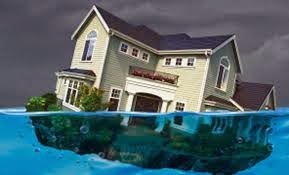A short sale is when someone has to (or wants to) sell his/her house but owes more on the house than the house is currently worth. People often find themselves in this situation when they bought their homes at "the height of the market" back in 2005.
A short sale doesn't mean your house won't sell..it will just take longer, and the process is quite tedious, but it is not impossible to have a favorable outcome. The first step when you are ready to list your home is to find a real estate agent that is familiar with short sales. The agent will need to offer advice on your home's current market value based on recent homes that have sold in the area.
.jpg)
The agent will need to alert potential buyers that the home is a "short sale", which gives them an indication that the process is more involved than a normal sale. Once an offer comes in, the offer will need to be submitted to the bank that holds the mortgage(s) for approval. The approval process is different depending on the bank. Many times, it can take several months to get an answer from the bank.
Along with the sales contract, there is quite a bit of paperwork that needs to be submitted to the bank including a hardship letter detailing why the seller is having trouble paying his/her mortgage, or why he/she needs to sell the house- job loss or transfer, death, divorce, etc. Tax returns, recent paystubs and bank statements will need to be included as well. Plus, a HUD-1 form detailing all the fees and closing costs associated with the deal, as the bank will want to know how much they can expect once all is said and done.
Once the bank receives the sales contract, buyer's mortgage preapproval letter or proof of funds, and deposit money, along with the financial package described previously and a comparative market analysis, then a negotiator is assigned to the case. After a few weeks the bank will have their own appraiser determine the fair market value of the property, (called a BPO).
During this time period, it is important for the listing agent to keep in contact with the bank and be on top of the process. Like I said, the approval process can take 2-6 months and sometimes you get to the end, only for the bank to turn down the deal. However, even if the short sale is approved, it is possible that unless negotiated with the bank, the homeowner may be liable for the "deficiency balance," or the difference between what the house sold for and what was actually owed on the mortgage.
Banks do seem to be becoming more and more flexible, as they realize that they will likely get even less money if the home goes into foreclosure, and they are not in the business of owning houses. With foreclosure, the homeowner becomes so far behind on his/her mortgage payment, that the bank works to obtain ownership of the property and evict the homeowner and auction off the property.
.png)
Having a foreclosure is worse on your credit history than going through a short sale. Foreclosures stay on credit reports for up to 7 years and it may be difficult to buy a property during that time, or even to rent a house. With a short sale, it may say that your mortgage balance was settled for less than the full amount, but it won't have as much of a negative effect as a foreclosure.
So all that being said, there are several reasons why if at all possible, it is better to do a short sale than to let your home fall into foreclosure. For more information, check out: http://www.makinghomeaffordable.gov/programs/exit-gracefully/Pages/hafa.aspx.
If you are considering a short sale, feel free to contact me at the number or email below.
Anne-Marie Tustin
Realtor Associate in NJ & PA
Keller Williams Realty
Princeton NJ
(609) 987-8889 office
(609) 575-8801 direct
atustin@kw.com
www.Anne-MarieTustin.com